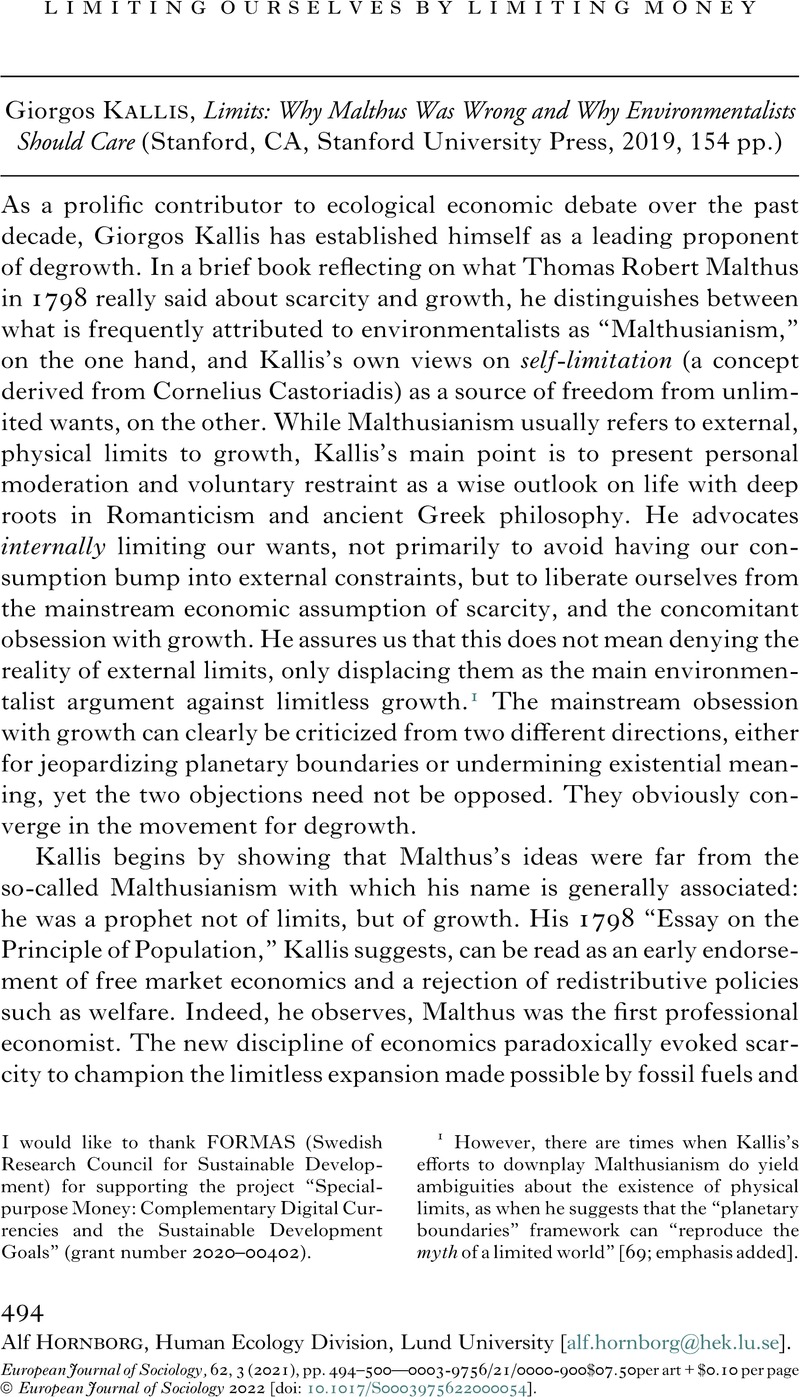Article contents
Limiting Ourselves by Limiting Money - Giorgos Kallis, Limits: Why Malthus Was Wrong and Why Environmentalists Should Care (Stanford, CA, Stanford University Press, 2019, 154 pp.)
Published online by Cambridge University Press: 05 May 2022
Abstract

- Type
- Book Review
- Information
- European Journal of Sociology / Archives Européennes de Sociologie , Volume 62 , Issue 3 , December 2021 , pp. 494 - 500
- Copyright
- © European Journal of Sociology 2022
Footnotes
I would like to thank FORMAS (Swedish Research Council for Sustainable Development) for supporting the project “Special-purpose Money: Complementary Digital Currencies and the Sustainable Development Goals” (grant number 2020–00402).
References
1 However, there are times when Kallis’s efforts to downplay Malthusianism do yield ambiguities about the existence of physical limits, as when he suggests that the “planetary boundaries” framework can “reproduce the myth of a limited world” [69; emphasis added].
2 The concept of general- or all-purpose money was introduced by the economic anthropologist Karl Polanyi [1957] to distinguish modern from premodern, special-purpose moneys [Karl Polanyi,1957, “The economy as instituted process,” in K. Polanyi, C. M. Arensberg, and H. W. Pearson, eds, Trade and markets in the early empires (Glencoe, ILL, The Free Press: 264-266.)].
3 Seaford, Richard, 2004, Money and the Early Greek Mind: Homer, Philosophy, Tragedy (Cambridge, Cambridge University Press).CrossRefGoogle Scholar
4 The tension between the nominal and the material value of coined money has plagued economic thought for over two millennia, as exemplified by John Locke’s 17th century perception of monetary value as inherent in the essence of silver [cf. Christine Desan, 2014, Making money: Coin, Currency, and the Coming of Capitalism (Oxford, Oxford University Press)]. I note, in passing, that the divergence between monetary signs and material substances is foundational to neoclassical economics, as the field is exclusively concerned with the former and thus remains unable to conceptualize unequal exchange in terms of the asymmetric transfers of material resources that are obscured by the (fictive) reciprocity of market prices.
5 Richard Seaford [2004: 166-67, n92] contrasts the traditional peasant “image of the limited good” [Foster 1965] with the new and unfamiliar notion of “an unlimited good” [cf. Hornborg 1992; Trawick and Hornborg 2015]. Cf. George Foster, 1965, “Peasant society and the image of limited good,” American Anthropologist, 67 (2): 293-315; Alf Hornborg, 1992, “Machine fetishism, value, and the image of unlimited good: Toward a thermodynamics of imperialism,” Man (New Series), 27: 1-18; Paul Trawick and Alf Hornborg, 2015, “Revisiting the image of limited good: On sustainability, thermodynamics, and the illusion of creating wealth,” Current Anthropology, 56 (1): 1-27.
6 The condemnation of money by St. Paul and Thomas Aquinas drew on Aristotle’s negative reaction to its ascendancy in ancient Greece. It has furthermore been suggested that Marx’s labor theory of value can be seen as a descendant of the doctrines of Aquinas [Tawney, cited in Bloch and Parry 1989: 3].
Maurice Bloch and Jonathan Parry, 1989, “Introduction: Money and the morality of exchange,” in J. Parry and M. Bloch, eds, Money and the morality of exchange (Cambridge, Cambridge University Press: 1-32).
7 Jacques Le Goff, 2012, Money in the Middle Ages (Cambridge, Polity).
8 Anitra Nelson, 2001, “Marx’s theory of the money commodity,” History of Economics Review, 33: 44-63.
9 Arturo Escobar, 2018, Designs for the Pluriverse: Radical interdependence, autonomy, and the making of worlds (Durham, NC, Duke University Press).
10 Herman E. Daly, 1996, Beyond growth (Boston, Beacon Press); Tim Jackson, 2009, Prosperity without growth: Economics for a finite planet (London, Earthscan); Giorgos Kallis, 2018, Degrowth (Newcastle upon Tyne, UK, Agenda); Serge Latouche, 2009, Farewell to growth (Cambridge, Polity); Kate Raworth, 2017, Doughnut economics: Seven ways to think like a 21st century economist (White River Junction, VT, Chelsea Green Publishing); Peter A. Victor, 2008. Managing without growth: Slower by design, not disaster (Cheltenham, Edward Elgar).
11 As an anthropologist, I cannot help noting that Kallis identifies ancient Greece as his virtuous “culture of limits,” with only scant mention of hunter-gatherers like the Yaka pygmies of Congo [52]. After all, for 95% of the history of our species, humans have managed to live well with limited wants and without the limitlessness of money [Sahlins 1972]. Marshall Sahlins, 1972, Stone age economics (Chicago, Aldine).
12 Alf Hornborg, 2017, “How to turn an ocean liner: A proposal for voluntary degrowth by redesigning money for sustainability, justice, and resilience,” Journal of Political Ecology, 24: 623-632; Alf Hornborg, 2019, Nature, society, and justice in the Anthropocene: Unraveling the money-energy-technology complex (Cambridge, Cambridge University Press).
13 Note that I am not suggesting a patchwork of “local currencies” but a single national CC for local use only, the reach of which is defined by the geographical position of its owner.
14 Contrary to other proposals for UBI, the use of a CC here would preclude the basic income contributing to the regular logic whereby consumption in the Global North implies exploitation of the Global South.
15 Recent attempts in this direction (i.e. combining CC and UBI) include Mumbuca in Brazil [Gonzalez et al. 2020] and the distribution of “basic vouchers” in South Korea [Seung-Yoon Lee et al. 2020]. Lauro Gonzalez, Adrian Kemmer Cernev, Marcelo Henrique de Araujo and Eduardo H. Diniz, 2020, “Digital complementary currencies and public policies during the COVID-19 pandemic,” Brazilian Journal of Public Administration, 54 (4): 1146-1160. Sophia Seung-Yoon Lee, Ji-eun Lee and Kyo-seong Kim, 2020, “Evaluating basic income, basic service, and basic voucher for social and ecological sustainability,” Sustainability, 12, 8348.
- 1
- Cited by




